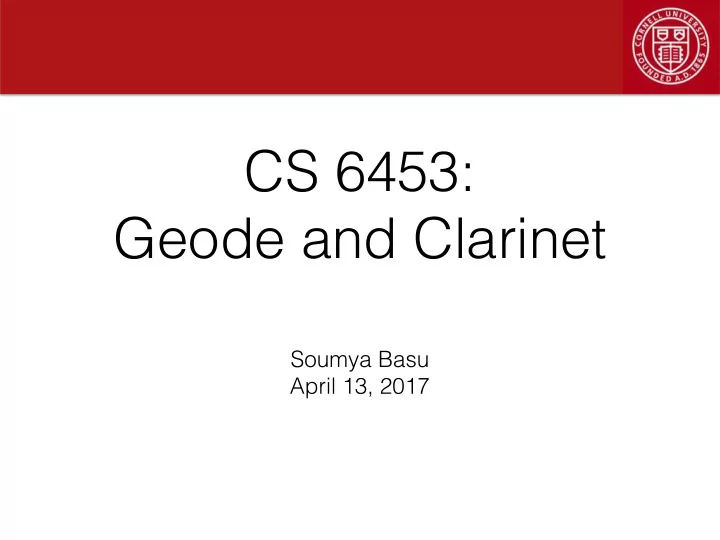

CS 6453: Geode and Clarinet Soumya Basu April 13, 2017
Motivation
Motivation
Status Quo Tens of datacenters 100s of Terabytes of bandwidth!
Why is this a problem? • Application demands are growing • Wide Area Network capacity is growing more slowly than Datacenter bisection bandwidth • (2015)1 Pb/s for datacenters vs 100 Tb/s for WAN • Different jurisdictions are getting more protective about data • Might be illegal to use this approach for analytics • Assumption: Derived data is OK to share
Geode
Related Work • Lots of prior work on distributed databases • Always assumed that databases were in a LAN • Transactional workloads (arbitrary, random queries) • Geode assumes that queries change slowly
Related Work • All prior work lacks some key feature that Geode provides • Solutions that don’t focus on bandwidth costs • Spanner, Mesa, RACS • Solutions that don’t handle the relational database model • Jetstream, Volley • Solutions that don’t handle multi-cloud scenarios • Hive, Pig, Spark
Batch Analytics Requirements • Optimize bandwidth costs • Constraints: • Sovereignty: Laws preventing data migration • Fault-tolerance: May have some replication • Non-issues: latency, consistency
More Assumptions • Data Birth: Cannot intelligently partition the data- locations are given • Fixed Queries, but supports slowly changing query workload • e.g. finding the top 10 bestselling books every day • Inter-Datacenter Bandwidth is scarce • Intra-datacenter bandwidth, cpu, storage free
Contributions • Subquery deltas • Pseudo-distributed measurement • Query optimization
Subquery Deltas • Cache all subqueries sent across datacenters • Subsequent queries are recomputed at the origin • Origin only sends the diff between the old and new output • In TPC-H, this saves 3.5x bandwidth on 6 of the queries
Pseudo-distributed measurement • How much data will be sent across the WAN for a particular query? • If queries stay the same, can create a plan per query • Two insights to make this measurement possible • Insert a WHERE clause into each SQL query to simulate per-partition output • Ignore partial aggregation in datacenters
Query Optimization • Centralized query planning from distributed database literature • Change cost functions based on bandwidth measurements • Two other problems • Site Selection: Where to run each task • Data Replication: Where copies are stored
Query Optimization (cont) • Naive approach: solve both problems using ILP • Solver timeout of 1 hour only handles ~10 datacenters • Greedy heuristic for site selection: pick the site where copying over the input data is cheapest • Use simple ILP to solve data replication
Limitations • Weak consistency is not useful for many types of applications • Completely ignores underlying privacy reasons behind data migration • Many step query analytics not expressible in Geode • This is solved by our next paper!
Clarinet
Problem Statment • Same geo-distributed setting as Geode • Clarinet minimizes query response time • Where a query takes ~seconds-minutes to run • WAN bandwidth is taken into account in model • Supports richer analytics queries than Geode (multi-stage queries)
Technical Contributions • Main insight: Let database incorporate WAN into evaluation of query plans • Three techniques introduced: • Late binding of the evaluation plan • Task Scheduling • Handling resource fragmentation
Late Binding • Normal query optimizer steps: • Generate possible query plans • Score all plans and pick the best one • Map the logical plan to a physical plan and execute
Late Binding • Clarinet query optimizer steps: • Generate possible query plans • Score all plans and pick the best one • Map all logical plans to physical plans • Score all physical plans and pick the best one
Multi-Query Late Binding • Generate possible query plans • Map all logical plans to physical plans, for all queries • Score all physical query plans, pick the shortest one • Reserve bandwidth on the network for that query • Repeat full process to pick the next query
Task Placement • Decided one stage at a time, minimizing per stage runtime • Scheduling of network transfers done by solving an ILP • Allows Clarinet to encode transfer dependencies • Doing task placement across queries is handled the same way
Resource Fragmentation • Naive network schedule simply follows the order the network was reserved in Late Binding step • This is Shortest Job First
Resource Fragmentation • Relaxation of SJF to k-SJF • Keep track of the k shortest jobs • If any of those flows are able to be scheduled, start it immediately • Fairness issue for long jobs, so add a deadline based heuristic to make things better • k has a sweet-spot to not increase average job completion time
Limitations • WAN Bandwidth varies, so assuming its constant is a bad assumption • Resource fragmentation solution is very ad-hoc • Not sure what the absolute numbers are in evaluation • Query response times decrease by 50%
Holy Grail • Interactive transactions • Both papers use ILP somewhere, so this technique would not work • Most of the overheads would be very stark with respect to the query processing time
Recommend
More recommend